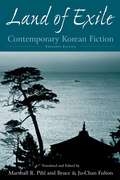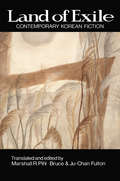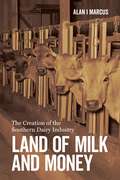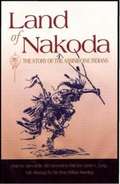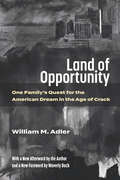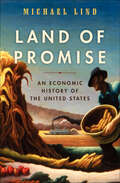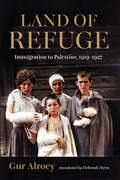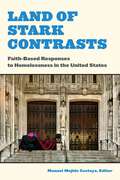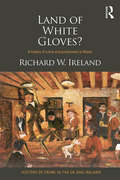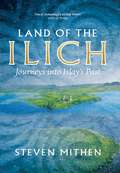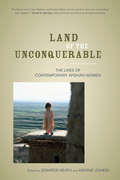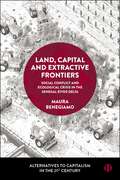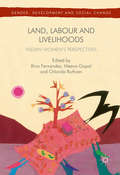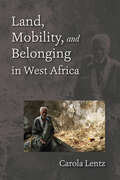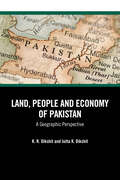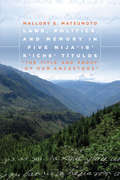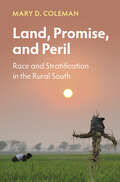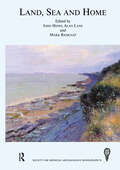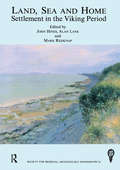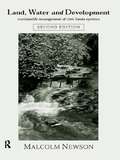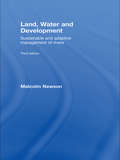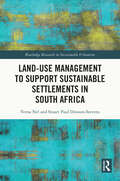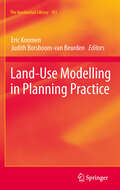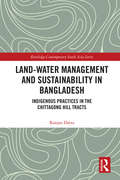- Table View
- List View
Land of Exile: Contemporary Korean Fiction
by Bruce Ju-Chan Fulton Marshall R. PihlAn anthology of contemporary Korean fiction including: "The Wife and Children"; "The Post Horse Curse"; "Mountains"; "Kapitan Ri"; "The Winter"; and "A Dream of Good Fortune".
Land of Exile: Contemporary Korean Fiction
by Marshall R. PihlAn anthology of contemporary Korean fiction including: "The Wife and Children"; "The Post Horse Curse"; "Mountains"; "Kapitan Ri"; "The Winter"; and "A Dream of Good Fortune."
Land of Milk and Money: The Creation of the Southern Dairy Industry
by Alan I. MarcusIn Land of Milk and Money, Alan I Marcus examines the establishment of the dairy industry in the United States South during the 1920s. Looking specifically at the internal history of the Borden Company—the world’s largest dairy firm—as well as small-town efforts to lure industry and manufacturing south, Marcus suggests that the rise of the modern dairy business resulted from debates and redefinitions that occurred in both the northern industrial sector and southern towns. Condensed milk production in Starkville, Mississippi, the location of Borden’s and the South’s first condensery, so exceeded expectations that it emerged as a touchstone for success. Starkville’s vigorous self-promotion acted as a public relations campaign that inspired towns in Tennessee, Alabama, Louisiana, and Texas to entice northern milk concerns looking to relocate. Local officials throughout the South urged farmers, including Black sharecroppers and tenants, to add dairying to their operations to make their locales more attractive to northern interests. Many did so only after small-town commercial elites convinced them of dairying’s potential profitability.Land of Milk and Money focuses on small-town businessmen rather than scientists and the federal government, two groups that pushed for agricultural diversification in the South for nearly four decades with little to no success. As many towns in rural America faced extinction due to migration, northern manufacturers’ creation of regional facilities proved a potent means to boost profits and remain relevant during uncertain economic times. While scholars have long emphasized northern efforts to decentralize production during this period, Marcus’s study examines the ramifications of those efforts for the South through the singular success of the southern dairy business. The presence of local dairying operations afforded small towns a measure of independence and stability, allowing them to diversify their economies and better weather the economic turmoil of the Great Depression.
Land of Nakoda: The Story of the Assiniboine Indians
by James L. LongThe oral tradition has considered the Nakoda as a singular, unique people from long before contact with Europeans.
Land of Opportunity: One Family's Quest for the American Dream in the Age of Crack
by William M. AdlerPart true crime, part work of urban sociology, Land of Opportunity is a meticulously researched account of the rise and fall of the Chambers brothers, who ran a multi-million-dollar crack cocaine operation in Detroit in the 1980s. Descended from Arkansas sharecroppers, BJ, Larry, and Willie Chambers moved to Detroit seeking economic opportunity, and built a successful drug empire by applying strict business principles to their trade; their business grossed an estimated $55 million annually until the brothers were sent to prison in 1989. Reading the Chambers brothers in the context of the fall of the Detroit auto-industry and its impact on the city’s economy and residents, Land of Opportunity demonstrates how for the Chambers brothers, crack dealing was a rational career choice; and through the Chambers brothers’ story, Adler provides bottom-up history of late Second Great Migration, deindustrialization, the War on Drugs, and crack era in both Detroit and the United States.
Land of Promise: An Economic History of the United States
by Michael LindMichael Lind’s Land of Promise is "[an] ambitious economic history of the United States . . . rich with details" (New York Times Book Review).How did a weak collection of former British colonies become an industrial, financial, and military colossus? From the eighteenth to the twenty-first centuries, the American economy has been transformed by wave after wave of emerging technology: the steam engine, electricity, the internal combustion engine, computer technology. Yet technology-driven change leads to growing misalignment between an innovative economy and anachronistic legal and political structures until the gap is closed by the modernization of America's institutions—often amid upheavals such as the Civil War and Reconstruction and the Great Depression and World War II.When the U.S. economy has flourished, government and business, labor and universities, have worked together in a never-ending project of economic nation building. As the United States struggles to emerge from the Great Recession, Michael Lind clearly demonstrates that Americans, since the earliest days of the republic, have reinvented the American economy—and have the power to do so again.
Land of Refuge: Immigration to Palestine, 1919–1927 (Perspectives on Israel Studies)
by Gur AlroeyAfter the First World War, tens of thousands of Jews immigrated to Palestine. They went there not to found a Zionist state but primarily to seek refuge from the violence and persecution of the Russian Civil War and its aftermath. Fleeing to the United States was not an option due to heavily restrictive immigration laws enacted there in the early 1920s.In Land of Refuge , the experiences of this generation of Jewish immigrants come vividly to life through a wealth of previously unstudied archival sources. Historian Gur Alroey skillfully weaves together the riveting and remarkable stories of survivors of pogroms and riots in Ukraine and Uramia, including widows, orphans, and survivors of rape and other unimaginable violence; migrants who risked harrowing journeys by boat, only to endure illness on the way, be detained or sent back, or have their luggage broken into or stolen; survivors of the famine in Russia during the Lenin and Stalin regimes; and marginalized Jews such as the mentally ill, thieves, prostitutes, and those with falsified entry visas. The stories of the people at the core of Land of Refuge form an important but little appreciated part of the history of the Jewish settlement in the Land of Israel.
Land of Stark Contrasts: Faith-Based Responses to Homelessness in the United States
by Manuel Mejido CostoyaAn important new volume showcasing a wide range of faith-based responses to one of today’s most pressing social issues, challenging us to expand our ways of understanding. Land of Stark Contrasts brings together the work of social scientists, ethicists, and theologians exploring the profound role of religion in understanding and responding to homelessness and housing insecurity in all corners of the United States—from Seattle, San Francisco, and Silicon Valley to Dallas and San Antonio to Washington, D.C., and Boston.Together, the essays of Land of Stark Contrasts chart intriguing ways forward for future initiatives to address the root causes of homelessness. In this way they are essential reading for practical theologians, congregational leaders, and faith-based nonprofit organizers exploring how to combine spiritual and material care for homeless individuals and other vulnerable populations. Social workers, nonprofit managers, and policy specialists seeking to understand how to partner better with faith-based organizations will also find the chapters in this volume an invaluable resource.Contributors include James V. Spickard, Manuel Mejido Costoya and Margaret Breen, Michael R. Fisher Jr., Laura Stivers, Lauren Valk Lawson, Bruce Granville Miller, Nancy A. Khalil, John A. Coleman, S.J., Jeremy Phillip Brown, Paul Houston Blankenship, María Teresa Dávila, Roberto Mata, and Sathianathan Clarke.Co-published with Seattle University’s Center for Religious Wisdom and World Affairs
Land of White Gloves?: A history of crime and punishment in Wales (History of Crime in the UK and Ireland)
by Richard IrelandLand of White Gloves? is an important academic investigation into the history of crime and punishment in Wales. Beginning in the medieval period when the limitations of state authority fostered a law centred on kinship and compensation, the study explores the effects of the introduction of English legal models, culminating in the Acts of Union under Henry VIII. It reveals enduring traditions of extra-legal dispute settlement rooted in the conditions of Welsh Society. The study examines the impact of a growing bureaucratic state uniformity in the nineteenth century and concludes by examining the question of whether distinctive features are to be found in patterns of crime and the responses to it into the twentieth century. Dealing with matters as diverse as drunkenness and prostitution, industrial unrest and linguistic protests and with punishments ranging from social ostracism to execution, the book draws on a wide range of sources, primary and secondary, and insights from anthropology, social and legal history. It presents a narrative which explores the nature and development of the state, the theoretical and practical limitations of the criminal law and the relationship between law and the society in which it operates. The book will appeal to those who wish to examine the relationships between state control and social practice and explores the material in an accessible way, which will be both useful and fascinating to those interested in the history of Wales and of the history of crime and punishment more generally.
Land of the Ilich: Journey's into Islay's Past
by Steven MithenAs an archaeologist, Steven Mithen has worked on the Hebridean island of Islay over a period of many years. In this book he introduces the sites and monuments and tells the story of the island’s people from the earliest stone age hunter-gatherers to those who lived in townships and in the grandeur of Islay House. He visits the tombs of Neolithic farmers, forts of Iron Age chiefs and castles of medieval warlords, discovers where Bronze Age gold was found, treacherous plots were made against the Scottish crown, and explores the island of today, which was forged more recently by those who mined for lead, grew flax, fished for herring and distilled whisky – the industry for which the island is best known today. Although an island history, this is far from an insular story: Islay has always been at a cultural crossroads, receiving a constant influx of new people and new ideas, making it a microcosm for the story of Scotland, Britain and beyond.
Land of the Unconquerable: The Lives of Contemporary Afghan Women
by Jennifer Heath Ashraf ZahediReaching beyond sensational headlines, Land of the Unconquerable at last offers a three-dimensional portrait of Afghan women. In a series of wide-ranging, deeply reflective essays, accomplished scholars, humanitarian workers, politicians, and journalists--most with extended experience inside Afghanistan--examine the realities of life for women in both urban and rural settings. They address topics including food security, sex work, health, marriage, education, poetry, politics, prisoners, and community development. Eschewing stereotypes about the burqa, the contributors focus instead on women's empowerment and agency, and their struggles for peace and justice in the face of a brutal ongoing war. A fuller picture of Afghanistan's women past and present emerges, leading to social policy suggestions and pragmatic solutions for a peaceful future.
Land, Capital and Extractive Frontiers: Social Conflict and Ecological Crisis in the Senegal River Delta (Alternatives to Capitalism in the 21st Century)
by Maura BenegiamoThis book examines ‘land-grabbing’ - its colonial roots and the fraught relationship between capital and nature amidst the current global socio-ecological crisis. Through ethnographic and archival research, Maura Benegiamo investigates an Italian company’s acquisition of 20,000 hectares in Senegal’s River Delta for agrofuel production and delves into the struggles of pastoral communities affected by the project. Through this landmark case, the book shows how European energy and global food security policies are reshaping rural spaces, expanding agrarian extractivism in sub-Saharan Africa. By shedding light on how contemporary capital–nature relationships perpetuate socio-ecological crises and colonial models, the book highlights the enduring forms of opposition to these processes. At the heart of these struggles lies a crucial question: how can we understand today’s crises while reclaiming alternative ways of living, producing and inhabiting the land?
Land, Labour and Livelihoods
by Orlanda Ruthven Bina Fernandez Meena GopalThis book brings together a unique collection of theoretical and empirical analyses of women's access to land, labour and livelihoods in contemporary India. The authors recognize that gender relations must be viewed intersectionally, along with other social relationships such as caste, ethnicity, religion, sexuality and age, in order to inform an integrated analysis of women's persistent disadvantage in India. The chapters examine a diverse range of rural and urban livelihoods within sectors such as tea plantations, nursing, hair salons, sex work and waste collection. Documenting the shifts in these sectors in the context of economic liberalization, the authors offer insights on the challenges of development interventions as women negotiate shifts in their livelihood options. Written to engage, the contributions to this book will be of interest both to the general reader and to academics and practitioners in development and gender/women's studies.
Land, Labour and Livelihoods: Indian Women's Perspectives (Gender, Development and Social Change)
by Orlanda Ruthven Bina Fernandez Meena GopalThis book brings together a unique collection of theoretical and empirical analyses of women’s access to land, labour and livelihoods in contemporary India. The authors recognize that gender relations must be viewed intersectionally, along with other social relationships such as caste, ethnicity, religion, sexuality and age, in order to inform an integrated analysis of women’s persistent disadvantage in India. The chapters examine a diverse range of rural and urban livelihoods within sectors such as tea plantations, nursing, hair salons, sex work and waste collection. Documenting the shifts in these sectors in the context of economic liberalization, the authors offer insights on the challenges of development interventions as women negotiate shifts in their livelihood options. Written to engage, the contributions to this book will be of interest both to the general reader and to academics and practitioners in development and gender/women’s studies.
Land, Mobility, and Belonging in West Africa: Natives and Strangers
by Carola LentzFocusing on an area of the savannah in northern Ghana and southwestern Burkina Faso, Land, Mobility, and Belonging in West Africa explores how rural populations have secured, contested, and negotiated access to land and how they have organized their communities despite being constantly on the move as farmers or migrant laborers. Carola Lentz seeks to understand how those who claim native status hold sway over others who are perceived to have come later. As conflicts over land, agriculture, and labor have multiplied in Africa, Lentz shows how politics and power play decisive roles in determining access to scarce resources and in changing notions of who belongs and who is a stranger.
Land, People and Economy of Pakistan: A Geographic Perspective
by K. R. Dikshit Jutta K. DikshitThe book unravels the complexity of Pakistan’s physical terrain, from the Arabian Sea coast to the Himalayan heights, focusing on its bio-climatic environment. While throwing light on the evolution of societal organisation and the nature and intensity of economic enterprises, it discusses the human response to the natural milieu and the way natural resources have been harnessed.This volume discusses the distribution of natural resources and deciphers the evolutionary development of manufacturing, transport and trade, the main non-agricultural enterprises, and looks at the potential for their growth. It provides an overview of the country`s economy and its fluctuations through different political regimes. It also investigates the country’s diverse social, linguistic, and ethnic composition. A habitat study, incorporating villages and towns and their numerical and spatial distribution and also the hierarchical organisation of rural society have received a special focus in the book.The book, with its qualitative and quantitative information, will be useful to students, teachers and researchers studying physical geology, climatology, hydrology, soil science, environmental studies, archaeology, sociology, economics, demography, area studies and regional development studies. It will also be an indispensable companion to professionals in floral-landscaping, habitat study, administrators, and policymakers.
Land, Politics, and Memory in Five Nija'ib' K'iche' Títulos: "The Title and Proof of Our Ancestors"
by Mallory MatsumotoLand, Politics, and Memory in Five Nija’ib’ K’iche’ Títulos is a careful analysis and translation of five Highland Maya títulos composed in the sixteenth century by the Nija’ib’ K’iche’ of Guatemala. The Spanish conquest of Highland Guatemala entailed a series of sweeping changes to indigenous society, not the least of which were the introduction of the Roman alphabet and the imposition of a European system of colonial government. Introducing the history of these documents and placing them within the context of colonial-era Guatemala, this volume provides valuable information concerning colonial period orthographic practice, the K’iche’ language, and language contact in Highland Guatemala. For each text, author Mallory E. Matsumoto provides a photographic copy of the original document, a transliteration of its sixteenth-century modified Latin script, a transcription into modern orthography, an extensive morphologic analysis, and a line-by-line translation into English, as well as separate prose versions of the transcription and translation. No complete English translation of this set of manuscripts has been available before, nor has any Highland Maya título previously received such extensive analytical treatment. Offering insight into the reality of indigenous Highland communities during this period, Land, Politics, and Memory in Five Nija’ib’ K’iche’ Títulos is an important primary source for linguists, historians, and experts in comparative literature. It will also be of significant interest to students and scholars of ethnohistory, linguistics, Latin American studies, anthropology, and archaeology.
Land, Promise, and Peril: Race and Stratification in the Rural South (Cambridge Studies in Stratification Economics: Economics and Social Identity)
by Mary D. ColemanIn Langston Hughes' 'Mother to Son,' (1922), written at a time of dramatic disruption in the American economy and continued tyranny in the lives of Black people, urban and rural, the Mother pleads with the child not to give up. She tells the child that she has been 'a climbing on, reaching landings and turning corners.' Not only did the seven families chronicled in this unique study not give up, while both losing and gaining ground, they managed to sponsor a generation of children, several of whom reached the middle and upper-middle classes. Land, Promise, and Peril chronicles the actions, actors, and events that propelled legal racism and quelled it, showing how leadership and political institutions play a crucial role in shaping the pace and quality of exits from poverty. Despite great odds, some domestics, sharecroppers, tenants, and farmers and their children navigated pathways toward the middle class and beyond.
Land, Sea and Home: Proceedings of a Conference on Viking-Period Settlement (The Society for Medieval Archaeology Monographs)
by John Hines Alan Lane Mark RedknapThe twenty-eight papers in this volume explore the practical !ife, domestic settings, landscapes and seascapes of the Viking world. Their geographical horizons stretch from Iceland to Russia, with particular emphasis on new discoveries in the Scandinavian homelands and in Britain and Ireland. With a rich combination of disciplinary perspectives, new interpretations are presented of evidence for buildings and technology, navigation, trade and military organization, the ideology of place, and cultural interactions and comparisons between Viking and native groups. Together, these reveal the multivalent importance of settlement archaeology and history for an understanding of the pivotal phase within the Middle Ages that was the Viking Period.
Land, Sea and Home: Settlement in the Viking Period
by John HinesThis book provides a realistic historical and geographical perspective to begin closest to the Scandinavian homelands of Vikings and the Viking ideology and material culture, by looking at new research into aspects of their use of the sea, maritime communications and trade.
Land, Water and Development: Sustainable Management of River Basin Systems
by Malcolm NewsonThis is a fully revised and expanded second edition of Malcolm Newson's acclaimed book. Exploring in greater depth the meaning of sustainability in river basin development this new edition:* highlights the rapid evolution of practical concepts since the Rio Earth Summit* features new illustrations and case studies from Australia, South Africa and Israel* makes the ecosystem model more explicit throughout* strengthens coverage of the linkages between land and water management.
Land, Water and Development: Sustainable and Adaptive Management of Rivers
by Malcolm NewsonWater is newsworthy: there is, or will be, a world water crisis. Aggravated by climate change, we are approaching the limits of human exploitation of freshwater resources, notably in growing essential food. The complexities and uncertainties associated with improving our management of fresh water take the potential remedies out of the hands of simple, local, hard engineering and into much larger units – the basin, the ecosystem and the global context, and also require longer term perspectives. The Third Edition follows the same structure as its predecessors, presenting the historical and scientific backgrounds to land-water interactions and establishing the links with development processes and policies. Throughout, its two major messages are that our new philosophy should be one of ‘humans in the ecosystem’ and that the guidance from science, being uncertain and contested, must be operationalized in a participatory system of governance based on participation. Following a review of progress towards these elements in the developed world, the international case studies update the situation in the developing world following the Millennium Development Goals, our new emphasis on poverty and on global food supplies. This book covers the multitude of scientific research findings, development of ‘tools’ and spatial/temporal scale challenges which have emerged in the last decade. Tensions are highlighted in the current and future role of large dams, country studies are retained (and considerably updated) and development contexts are explored in greater depth as a dividing line in capacity to cope with land and water stress. "Technical issues" have been expanded to cover major droughts, environmental flows and the restoration of rivers and wetlands. A separate chapter picks up these themes under terms of their relationship with uncertainty and the widespread perception that a new ethos of adaptive management is needed in the water sector. For students of geography, environmental science, hydrology, and development studies this innovative edition provides a reasoned, academic basis of evidence for sustainable, adaptive management of rivers and related large-scale ecosystems using more than 600 new sources. It will also prove invaluable for lecturers and practitioners.
Land-Use Management to Support Sustainable Settlements in South Africa (Routledge Research in Sustainable Urbanism)
by Verna Nel Stuart Denoon-StevensThis book provides a theoretical and practical foundation needed to change the practice of land use management in Southern Africa. It presents an overview of alternative land use management system for South African municipalities that is economically, socially and environmentally more sustainable than many of the land use schemes in effect at present. Land use management is a component of spatial governance that controls the nature and extent of development to prevent harmful impacts on people and the environment. As the current system with its colonial/modernist planning and regulatory mechanisms were never designed to deal with rapid change, urbanisation and informality, a different form of land development and land use management is necessary. This timely book reflects the culmination of many years of practical experience and research into various aspects of land use management by the authors and studies undertaken by their master’s and doctoral students. The book goes beyond an analysis of the problems and suggests concrete proposals that can be applied throughout Southern Africa based on a rural to urban transect. This book is directed to a broad range of readers interested in spatial planning and land use management. It will be of interest to those in the fields of geography, urban studies, urban design, planning and architecture.
Land-Use Modelling in Planning Practice
by Eric Koomen Judith Borsboom-van BeurdenThis book provides an overview of recent developments and applications of the Land Use Scanner model, which has been used in spatial planning for well over a decade. Internationally recognized as among the best of its kind, this versatile model can be applied at a national level for trend extrapolation, scenario studies and optimization, yet can also be employed in a smaller-scale regional context, as demonstrated by the assortment of regional case studies included in the book. Alongside these practical examples from the Netherlands, readers will find discussion of more theoretical aspects of land-use models as well as an assessment of various studies that aim to develop the Land-Use Scanner model further. Spanning the divide between the abstractions of land-use modelling and the imperatives of policy making, this is a cutting-edge account of the way in which the Land-Use Scanner approach is able to interrogate a spectrum of issues that range from climate change to transportation efficiency. Aimed at planners, researchers and policy makers who need to stay abreast of the latest advances in land-use modelling techniques in the context of planning practice, the book guides the reader through the applications supported by current instrumentation. It affords the opportunity for a wide readership to benefit from the extensive and acknowledged expertise of Dutch planners, who have originated a host of much-used models.
Land-Water Management and Sustainability in Bangladesh: Indigenous practices in the Chittagong Hill Tracts (Routledge Contemporary South Asia Series)
by Ranjan DattaIndigenous sustainability and environmental management cannot be understood apart from a community, its traditions, and ways of practices. Interest in Indigenous environmental sustainability has grown steadily in past years, reflecting traditional cultural perspectives about the environment and developing research priorities. This book explores the ways one Indigenous community, in the Chittagong Hill Tracts in Bangladesh, has reinvented the meanings of sustainability using traditional knowledge to blend traditional sentiment with large-scale dislocations within their own communities and international economy. This book includes up-to-date research on meanings and implications of Bangladeshi Indigenous sustainability which focus on relationality, traditional knowledge, spirituality and hybridity. Environmental protection and Indigenous land-water rights have been ignored in the region and there has been minimal research on these intersecting issues locally or internationally. Land-Water Management and Sustainability in Bangladesh addresses this gap in an examination of postcolonial Indigenous communities’ complex and shifting relationships to nature and in relation to discrimination and oppression regarding Indigenous land and rights. The book makes a contribution to both the research literature and on the ground practice in inspiring a new culture of sustainability in Indigenous regions. Bringing together community engagement, activism, critical research and scholarship to advocate for socio-environmental justice and trans-systematic sustainability of cross-cultural knowledge, the book will be of interest to academics of a variety of disciplines, including environmental policy, conservation practices, Indigenous studies environmental sustainability, anthropology, American studies, Asian Studies and ethnic studies.
